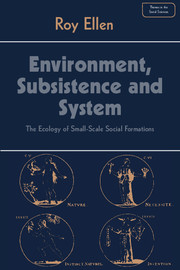Book contents
- Frontmatter
- Contents
- Preface
- Acknowledgements
- 1 ENVIRONMENTAL DETERMINISM AND CAUSAL CORRELATION
- 2 POSSIBILISM AND LIMITING FACTORS
- 3 CULTURAL ECOLOGY AND THE EXPLANATORY IMPERATIVE
- 4 HUMAN ECOLOGY AND THE BIOLOGICAL MODEL
- 5 THE FLOW OF ENERGY AND MATERIALS
- 6 ECOSYSTEMS AND SUBSISTENCE PATTERNS I
- 7 ECOSYSTEMS AND SUBSISTENCE PATTERNS II
- 8 SYSTEMS AND THEIR REGULATION
- 9 INFORMATION AND THE MANIPULATION OF THE ENVIRONMENT
- 10 ADAPTATION: A SUMMARY AND RECONSIDERATION
- 11 THE REPRODUCTION AND EVOLUTION OF SOCIAL AND ECOLOGICAL SYSTEMS
- 12 ECOLOGY IN ANTHROPOLOGICAL METHOD AND THEORY
- Notes
- Bibliography
- Name Index
- Subject Index
10 - ADAPTATION: A SUMMARY AND RECONSIDERATION
Published online by Cambridge University Press: 05 June 2012
- Frontmatter
- Contents
- Preface
- Acknowledgements
- 1 ENVIRONMENTAL DETERMINISM AND CAUSAL CORRELATION
- 2 POSSIBILISM AND LIMITING FACTORS
- 3 CULTURAL ECOLOGY AND THE EXPLANATORY IMPERATIVE
- 4 HUMAN ECOLOGY AND THE BIOLOGICAL MODEL
- 5 THE FLOW OF ENERGY AND MATERIALS
- 6 ECOSYSTEMS AND SUBSISTENCE PATTERNS I
- 7 ECOSYSTEMS AND SUBSISTENCE PATTERNS II
- 8 SYSTEMS AND THEIR REGULATION
- 9 INFORMATION AND THE MANIPULATION OF THE ENVIRONMENT
- 10 ADAPTATION: A SUMMARY AND RECONSIDERATION
- 11 THE REPRODUCTION AND EVOLUTION OF SOCIAL AND ECOLOGICAL SYSTEMS
- 12 ECOLOGY IN ANTHROPOLOGICAL METHOD AND THEORY
- Notes
- Bibliography
- Name Index
- Subject Index
Summary
For the knowledge of historical phenomena in their concreteness, the most general laws, because they are most devoid of content, are also the least valuable.
Max Weber 1949:80INTRODUCTION
It would have been impossible to avoid introducing the concept of adaptation in the preceding parts of this book, given its central explanatory role. Nonetheless, I have reserved a more specific treatment until some of the major anthropological approaches to the ecological problematic have been presented. In this way it is possible to clarify certain discussions in the literature which might otherwise appear unnecessarily complicated, polemical and abstract. As might be expected from the structure of that discourse already examined, the limits of the debate are set by, on the one hand, those who adhere to a strict Darwinian model and express amazement at its neglect in contemporary anthropological theory and, on the other, those who insist that definitions of adaptation must be framed with specific reference to the human condition. It is hardly surprising that empirical case material suggests that the appropriate theory lies somewhere in between; not in the form of some woolly minded compromise, but as a subtle conceptual articulation.
It is possible to identify four distinct types of adaptation among biological organisms:
1 phylogenetic, in which a genotype (the genetic constitution of an individual) adapts trans-generationally through natural selection;
[…]
- Type
- Chapter
- Information
- Environment, Subsistence and SystemThe Ecology of Small-Scale Social Formations, pp. 236 - 251Publisher: Cambridge University PressPrint publication year: 1982

